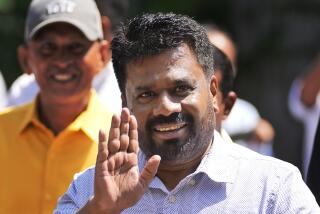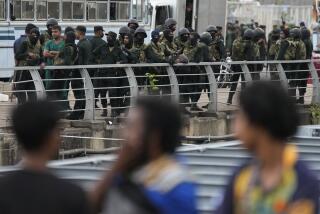Sri Lankan president dismisses nation’s first female chief justice
- Share via
NEW DELHI, India -- Sri Lankan President Mahinda Rajapaksa sacked the nation’s first female chief justice Sunday despite protests by lawyers, human rights groups and clergy members, including some concerned over the growing clout of the president and his family.
Chief Justice Shirani Bandaranayake’s dismissal, effective immediately, occurred when Rajapaksa ratified a Friday parliamentary vote to impeach her on corruption charges. She has denied the charges made by a parliament dominated by Rajapaksa supporters.
The president’s ratification follows a standoff between the judiciary and the government over Bandaranayake, 54, who in recent months has issued rulings against the government. Most notable of these was her ruling in September that a development bill proposed by the president’s brother, economic development minister Basil Raja, face approval by local councils. The government has denied the impeachment is related to her rulings against the government.
Sri Lanka’s Supreme and Appeals courts ruled last month that her impeachment was unconstitutional.
The United States and the U.N. have voiced concern for the integrity of justice in the country in light of the case.
The three charges leveled by parliament against Bandaranayake in December, of the 14 originally considered, were related to financial impropriety based on non-declaration of assets and conflict of interest involving a case over a failed investment company.
Bandaranayake did not comment initially on her dismissal Sunday.
On several occasions, the government has encouraged thousands of its supporters to demonstrate publicly against Bandaranayake. “The president has said ... that he was in agreement with the request for the removal of the chief justice from office,” Rajapaksa’s office said Sunday in a statement.
Some analysts have warned that Bandaranayake’s dismissal could spark a constitutional standoff and leave the courts largely inoperable. Lawyers boycotted court proceedings Thursday and Friday over the impeachment issue.
Some Sri Lankan attorneys, including members of Lawyers Collective, a judiciary activist group, have urged judges and lawyers not to recognize Bandaranayake’s replacement, who will be named by the president.
“The politically motivated process of removal of the chief justice was nothing but a misuse and abuse of constitutional provisions,” the lawyers collective said Sunday in a statement.
Rajapaksa, elected in 2005, and his brothers have enjoyed strong domestic support after they brought to an end a civil war that lasted nearly a quarter of a century by defeating the separatist Liberation Tigers of Tamil Eelam, or Tamil Tigers.
But they’ve been accused of overseeing toward the end of the war the unlawful killing of civilians by security forces and paramilitary groups allied with the government, charges the government has strongly denied. A United Nations panel has said that war crimes accusations against the Sri Lankan government were credible and should be investigated.
ALSO:
Saudi king chooses women for spots on advisory council
French agent, soldier reported killed in botched raid in Somalia
Year after wreck, salvage of Costa Concordia falls behind schedule
More to Read
Sign up for Essential California
The most important California stories and recommendations in your inbox every morning.
You may occasionally receive promotional content from the Los Angeles Times.













